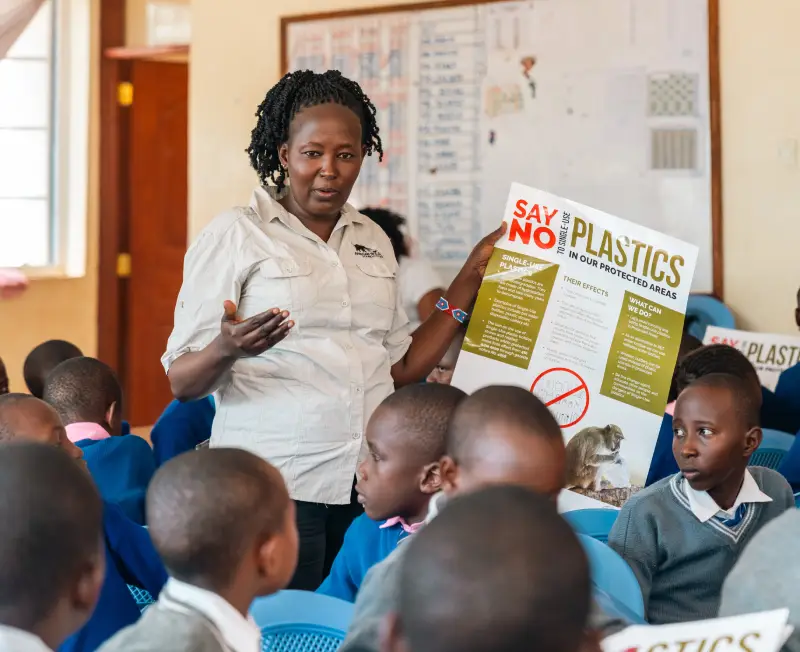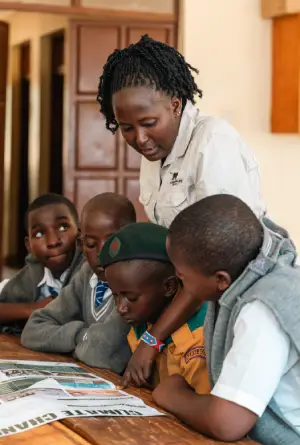Margaret Mereyian: Inspiring the Next Generation of Conservation Leaders

Margaret Mereyian engages students during a recent mobile visit to schools within the Tsavo landscape.
Growing up on the vast, sun-soaked Athi-Kapiti Plains, just south of Nairobi National Park, Margaret Mereyian spent her school breaks grazing her family’s livestock. The open landscape was alive with zebras, wildebeests, and antelopes, creating a dynamic backdrop to her daily routine.
“I remember a baby antelope once following me home,” she said, her face lighting up at the memory. “It blended so naturally with our goats and sheep. Moments like that reminded me how deeply connected our lives were to the wildlife around us.”
For Mereyian’s Maasai community, livestock was both a livelihood and a cultural identity. But living alongside wildlife brought challenges, such as predator attacks that tested the delicate balance of co-existence.
“One night, a pack of hyenas raided our boma (traditional cattle pen), and we lost half of the livestock that supported five families,” Mereyian recalled. “It was devastating and reminded us how fragile coexistence with wildlife can be.”

Margaret Mereyian, AWF's Senior Officer of the Conservation Education Program, engages students.
Faced with frequent hyena attacks, her community sometimes resorted to using poison-laced bait to control the threats. In response, the Kenya Wildlife Service (KWS) organized awareness sessions for the community and local schools, promoting co-existence. They introduced predator-proof bomas, which are reinforced with sturdy materials such as chain-link fences to protect livestock from wildlife attacks.
Mereyian recalls how her first encounter with Kenya Wildlife Service personnel, at just seven years old, ignited her passion for conservation.
“I was mesmerized by the KWS officers’ neat green uniforms and their dedication to protecting wildlife,” she said. “It inspired me to follow their path and take responsibility for conservation.”
During primary and high school, she nurtured her passion for conservation by actively participating in wildlife clubs, where activities like tree planting and park excursions deepened her connection with nature.
Fueled by this passion, Mereyian pursued further education after high school at the Kenya Wildlife Service Training Institute, where she earned a Diploma in Environmental Management. She then went on to complete a bachelor’s degree in Natural Resource Management at Africa Nazarene University.
"I’m not done yet," she said with determination. "Currently, I’m pursuing a master’s in Environmental Management at The Open University in the United Kingdom, supported by a Commonwealth Scholarship."
Her early professional career began at the National Environment Management Authority (NEMA), Kenya’s environmental regulator, where she gained valuable insights into how people and nature coexist in Kenya.
Mereyian later led grassroots initiatives that empowered women to rehabilitate degraded ecosystems and mentored young people in environmental stewardship.
“In my diverse roles, I worked in Naivasha, Limuru, and Kajiado counties, using tree planting to engage communities in conservation,” she explained. “I also involved youth through school environmental clubs, setting up tree nurseries, planting trees, and organizing community clean-ups.”
Her work with the Maasai Girls Education Fund, which supported her undergraduate studies, became a significant turning point. As a program coordinator, she led life-skills workshops in more than 80 primary schools in Kilifi County, improving school retention and academic performance. She also facilitated financial management training for women groups, enabling them to start small businesses as a climate change adaptation strategy.
Her experiences working directly with communities facing water shortages reinforced her belief that empowering people—particularly women and youth—is key to sustainable conservation. As a technical specialist in natural resource management and a business consultant, she collaborated with stakeholders at all levels to support community-led conservation initiatives.
Joining AWF and Empowering Young Conservationists
In 2021, Mereyian joined the African Wildlife Foundation (AWF) as a Conservation Education Officer, inspired by the organization’s people-centered approach to conservation. Through the AWF Classroom Africa project, she worked with partners to equip children in over ten schools across Tanzania, the Democratic Republic of the Congo (DRC), Zambia, and Uganda with conservation knowledge and skills.
Today, she leads a transformative project in Kenya’s Tsavo Landscape, building a movement of young conservationists who advocate for wildlife conservation and habitat protection. Her work includes strengthening wildlife clubs by introducing technology, providing conservation awareness materials, and organizing landscape-wide events and competitions.
“The most rewarding aspect of working with AWF has been mentoring schoolchildren,” she says. “Seeing them embrace environmental stewardship and advocate for peaceful coexistence and wildlife conservation in their communities gives me hope for the future.”
Mereyian believes that increased female leadership in conservation is crucial for sustainable resource management and environmental protection.
"We must act now to protect our environment. Every action, no matter how small, contributes to a better future. Whether it’s advocating for conservation policies, educating others, or integrating sustainability into daily life, everyone has a role to play," she says.
Read more about how AWF is building a movement of young conservationists